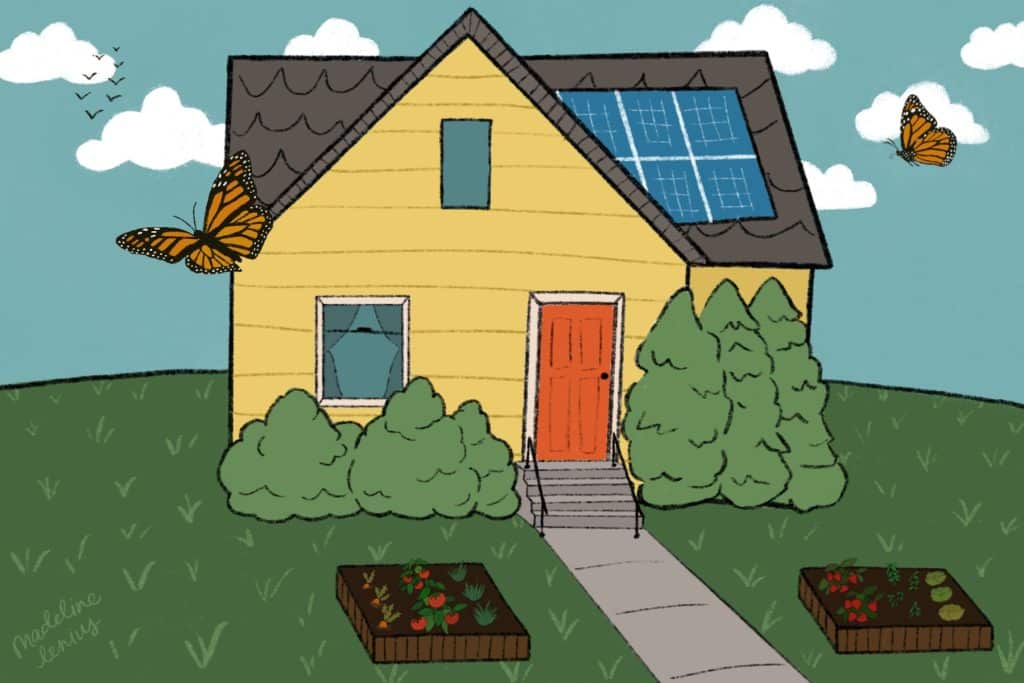
One Minnesotan’s commitment to decarbonization
When Lee Schaefer retired after 30 years of serving as an Episcopal priest, he decided to dedicate his time and resources to environmental justice.
“What’s influenced me to get involved, I suppose, is science,” he said. “Indeed we’re on track to destroy the human race. And that meant my children, grandchildren, and great-grandchildren were at risk – and what was I going to do about it? Was I just going to sit back and do nothing? Or was I actually going to make a difference?”
Decarbonizing his home
Lee became involved with MNIPL after a Climate Conversation at his church and has volunteered with the organization, as well as MN350 and others. Additionally, he has been in the process of moving towards carbon zero at his home.
“I retired in 2019, got divorced, and had I think leftover, 35 thousand dollars in my pension and social security ultimately and put what I could scrape together, bought a house,” Lee said. “In 2020, I put in 8 solar panels. In 2021, I put in 8 more. In late 2020, I also bought an EV and a charging station.”
He eventually replaced his roof to add 16 more solar panels, insulated the house, installed a heat pump and hybrid water heater, and planted vegetable gardens. Lee has bought an electric snowblower, lawn mower, weed trimmer, hedge trimmer. Next year he plans to buy an inductive stove and electric dryer. He’s stopped buying plastic as much as possible, uses dissolvable laundry detergent sheets, air drys a lot of his laundry, takes the train to visit family out of state rather than flying, and composts most organic waste.
“I was surprised, I guess, as I paired down, how nice it feels that I can live on less and less. Of course that was a part of my upbringing. We were brought up on a wing on a prayer so to speak so this feels like how life should be lived… My father went bankrupt three times, the electricity got turned off, we worked hard. We just didn’t have a lot, but we didn’t need a lot, and I found that I could be very happy with very little and that has remained the case.”
A significant part of Lee’s motivation to live sustainably is his value of personal responsibility.
“My feeling is, you’re the only person who you control so you better do all you can… If you don’t do it, why should anyone else? That’s just being a hypocrite.”
Paying it forward
He also strives to help others pursue this kind of lifestyle.
“The other reason I do it is because people have questions. How does your heat pump work? How much did it cost? Who installed it? Do they work in the winter okay? What about the summer? Do they really cut your energy costs? What about solar panels? What impact do they make? How much do they cost? How much did you get from the government?”
While Lee strives to be a resource for others, he says that he certainly isn’t an expert. Most of what he knows he has learned through trying new things and problem-solving.
“The way to find out about something is to actually do it and find out the problems that guide you. The people that installed my heat pump didn’t know that they’d have to put in a 200 amp service for 45 hundred dollars. Well, it’s nice to know that so I can tell folks, ‘By the way, when you get some stuff and start upgrading, ask if you will need to get a new fuse box. If you have to go from one to two hundred amps how much is that going to cost? What kind of benefit will that provide?’ For me it was nice having a brand new fuse box. I think it’ll help sell the house, makes it safer. There are all kinds of advantages, plus I’m learning things as I go… to me, it’s all about learning how things work and paying attention and finding resources.”
The perks of sustainability
Another thing he’s learned through this process is that in addition to being better for the environment, energy efficiency, clean energy, and waste reduction has financial benefits. Many of his electric appliances and tools work better than the old ones and break less frequently. He especially enjoys his electric car which has significantly less parts than a gas-powered vehicle, making maintenance much easier.
“There is no upkeep with an EV basically. It’s actually cheaper to do this in the long run. The gas companies don’t want you to know that. Or car companies, I mean to think that you don’t need to get a new carburetor or exhaust system, you don’t have to pay for gas or oil changes.”
Often when people hear about this lifestyle of simplicity, it sounds like a sacrifice. However, Lee emphasized that it can be an abundant and fulfilling way to live.
“I’ve found with my EV it takes longer to get places, because it takes time to charge it, but I arrive refreshed, feeling like I’m ready to go… I try not to buy stuff new if I can help it, to reuse is a wonderful thing. Living more simply, I think, is wonderful. And of course this is why I can spend so much money on all this stuff… I’m all about simplicity. Being a retired priest, I preached that. There’s a lot of value in living simply so others may simply live.”
Individual vs. Systemic Change
While further systemic changes are needed to address the climate crisis, lifestyle changes in individual households and smaller communities is an important step. Becoming directly involved in environmental justice has helped Lee find purpose and a sense of hope for the future.
“What’s helped me stay grounded is seeing all the advances in science and that right now we can actually reach carbon zero, if we have the willingness to do so. And that for me personally, I’ve been getting closer and closer to carbon zero… I can, with a few more little changes, get very close. And I’m not a rich person, I didn’t have any assets after my divorce, so I started really from ground zero and just decided that this is something that is a priority with me. I wish more people would see that and act on it.”
A vision for a future world
Grounded in his faith and values, Lee imagines a world where everyone has the resources to thrive without exploiting the natural world.
“If we didn’t have to rely on the big power companies… I think that would create empowerment and a sense of independent wealth. I can make my own electricity, so I can produce my own warmth, my own cooking, fire, I can be independent. And hopefully then we could also share better. That instead of seeing ourselves as in competition with each other, we’d start seeing each other as interdependent because we all certainly are,” Lee said. “We all have to work together to make a difference and to make sure that people are taken care of… Everyone needs to feel as if they’re part of the solution, as well as being taken care of. I have seen incredible poverty and it infuriates me to think that people live with so little while others have so much. It’s a matter of trying to be more equitable… Everybody should have enough to eat, everybody should have a roof over their head, everybody should have healthcare. Period… No one has too much, no one has too little. Everyone shares a life to make sure we all have enough.”
Do you have a story to share?
Your community's climate actions are inspiring! Share your story with others ...
